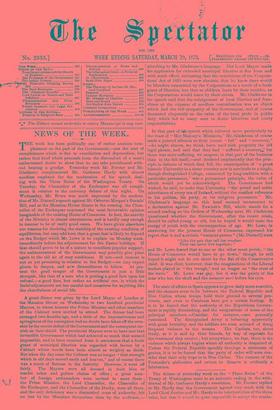In that part of his speech which referred more particularly
to the toast of "Her Majesty's Ministers," Mr. Gladstone of course made a pointed allusion to their recent " fall " and "recovery," —he might almost, we think, have used with propriety the old legal phrase, and said that they had "suffered a recovery; for there was more suffering, we suspect, in that part of the business than in the fall itself,—and declared emphatically that the prin- ciple in defence of which they fell, the emancipation of "a great historic University in a sister country now in servitude to a single, though distinguished College, connected by long tradition with a particular persuasion," was a permanent principle, the value of which would yet be acknowledged. The Government had wished, he said, to make that University "the proud and noble inheritance of every son of Ireland, without the smallest reference to his politics, his party, or his religious persuasion." Mr. Gladstone's language on this head seemed tantamount to a declaration against Mr. Fawe,ett's Bill, which stands for a second reading on the Orders of Wednesday next. Mr. Gladstone questioned whether the Government, after the recent crisis, should be called young or old, but he hoped it would unite the energy of youth with the circumspection of age. Mr. Lowe, in answering for the present House of Commons, expressed his regret that it and a certain "eminent person " (Mr.Disraeli) were
"Like the pair that tell the weather, They can never live together; "
and Mr. Lowe feared that as one or the other must perish, "the House of Commons would have to go down," though he still hoped it might not be cut short by the fiat of the Conservative chief. It was clear, however, that the imaginations of the Liberal leaders played in "the trough," and no longer on "the crest of the wave." Mr. Lowe was gay, but it was the gaiety of the man who has the skull and the memento mori before his eyes.






































